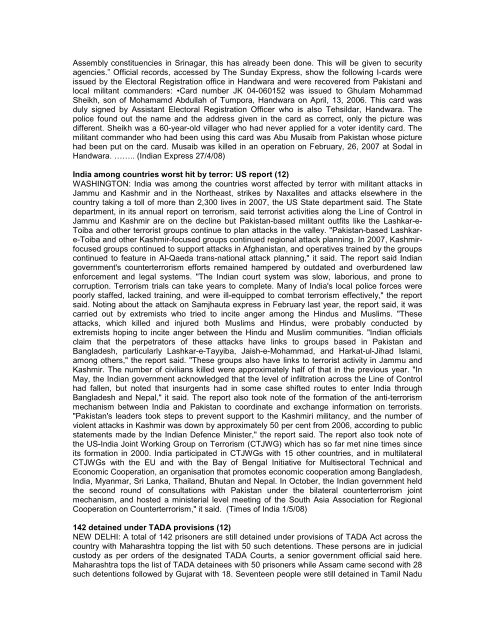TERRORISM - 2008 - Indian Social Institute
TERRORISM - 2008 - Indian Social Institute
TERRORISM - 2008 - Indian Social Institute
Create successful ePaper yourself
Turn your PDF publications into a flip-book with our unique Google optimized e-Paper software.
Assembly constituencies in Srinagar, this has already been done. This will be given to security<br />
agencies.” Official records, accessed by The Sunday Express, show the following I-cards were<br />
issued by the Electoral Registration office in Handwara and were recovered from Pakistani and<br />
local militant commanders: •Card number JK 04-060152 was issued to Ghulam Mohammad<br />
Sheikh, son of Mohamamd Abdullah of Tumpora, Handwara on April, 13, 2006. This card was<br />
duly signed by Assistant Electoral Registration Officer who is also Tehsildar, Handwara. The<br />
police found out the name and the address given in the card as correct, only the picture was<br />
different. Sheikh was a 60-year-old villager who had never applied for a voter identity card. The<br />
militant commander who had been using this card was Abu Musaib from Pakistan whose picture<br />
had been put on the card. Musaib was killed in an operation on February, 26, 2007 at Sodal in<br />
Handwara. …….. (<strong>Indian</strong> Express 27/4/08)<br />
India among countries worst hit by terror: US report (12)<br />
WASHINGTON: India was among the countries worst affected by terror with militant attacks in<br />
Jammu and Kashmir and in the Northeast, strikes by Naxalites and attacks elsewhere in the<br />
country taking a toll of more than 2,300 lives in 2007, the US State department said. The State<br />
department, in its annual report on terrorism, said terrorist activities along the Line of Control in<br />
Jammu and Kashmir are on the decline but Pakistan-based militant outfits like the Lashkar-e-<br />
Toiba and other terrorist groups continue to plan attacks in the valley. "Pakistan-based Lashkare-Toiba<br />
and other Kashmir-focused groups continued regional attack planning. In 2007, Kashmirfocused<br />
groups continued to support attacks in Afghanistan, and operatives trained by the groups<br />
continued to feature in Al-Qaeda trans-national attack planning," it said. The report said <strong>Indian</strong><br />
government's counterterrorism efforts remained hampered by outdated and overburdened law<br />
enforcement and legal systems. "The <strong>Indian</strong> court system was slow, laborious, and prone to<br />
corruption. Terrorism trials can take years to complete. Many of India's local police forces were<br />
poorly staffed, lacked training, and were ill-equipped to combat terrorism effectively," the report<br />
said. Noting about the attack on Samjhauta express in February last year, the report said, it was<br />
carried out by extremists who tried to incite anger among the Hindus and Muslims. "These<br />
attacks, which killed and injured both Muslims and Hindus, were probably conducted by<br />
extremists hoping to incite anger between the Hindu and Muslim communities. "<strong>Indian</strong> officials<br />
claim that the perpetrators of these attacks have links to groups based in Pakistan and<br />
Bangladesh, particularly Lashkar-e-Tayyiba, Jaish-e-Mohammad, and Harkat-ul-Jihad Islami,<br />
among others," the report said. "These groups also have links to terrorist activity in Jammu and<br />
Kashmir. The number of civilians killed were approximately half of that in the previous year. "In<br />
May, the <strong>Indian</strong> government acknowledged that the level of infiltration across the Line of Control<br />
had fallen, but noted that insurgents had in some case shifted routes to enter India through<br />
Bangladesh and Nepal," it said. The report also took note of the formation of the anti-terrorism<br />
mechanism between India and Pakistan to coordinate and exchange information on terrorists.<br />
"Pakistan's leaders took steps to prevent support to the Kashmiri militancy, and the number of<br />
violent attacks in Kashmir was down by approximately 50 per cent from 2006, according to public<br />
statements made by the <strong>Indian</strong> Defence Minister," the report said. The report also took note of<br />
the US-India Joint Working Group on Terrorism (CTJWG) which has so far met nine times since<br />
its formation in 2000. India participated in CTJWGs with 15 other countries, and in multilateral<br />
CTJWGs with the EU and with the Bay of Bengal Initiative for Multisectoral Technical and<br />
Economic Cooperation, an organisation that promotes economic cooperation among Bangladesh,<br />
India, Myanmar, Sri Lanka, Thailand, Bhutan and Nepal. In October, the <strong>Indian</strong> government held<br />
the second round of consultations with Pakistan under the bilateral counterterrorism joint<br />
mechanism, and hosted a ministerial level meeting of the South Asia Association for Regional<br />
Cooperation on Counterterrorism," it said. (Times of India 1/5/08)<br />
142 detained under TADA provisions (12)<br />
NEW DELHI: A total of 142 prisoners are still detained under provisions of TADA Act across the<br />
country with Maharashtra topping the list with 50 such detentions. These persons are in judicial<br />
custody as per orders of the designated TADA Courts, a senior government official said here.<br />
Maharashtra tops the list of TADA detainees with 50 prisoners while Assam came second with 28<br />
such detentions followed by Gujarat with 18. Seventeen people were still detained in Tamil Nadu

















